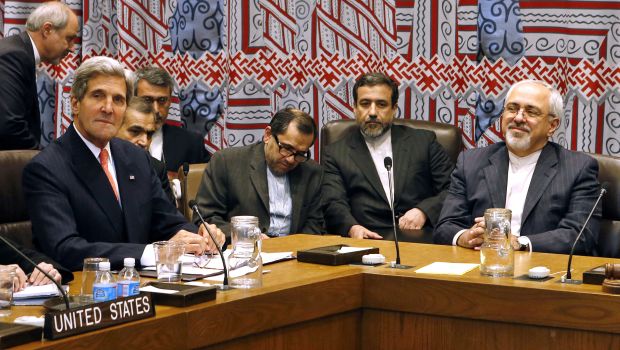
U.S. Secretary of State John Kerry, left, and Iranian Foreign Minister Mohammad Javad Zarif attend a meeting of the five permanent members of the Security Council plus Germany during the 68th session of the United Nations General Assembly at U.N. headquarters, Thursday, Sept. 26, 2013. (AP Photo/Jason DeCrow)
Zarif wrote on his Twitter account: “President Obama’s presumption that Iran is negotiating because of his illegal threats and sanctions is disrespectful to the nation, macho and wrong.” In a subsequent post he wrote: “President Obama needs consistency to promote mutual confidence. Flip flop destroys trust and undermines US credibility.”
Zarif’s comments followed a week of intense diplomacy, including in a phone call between Obama and Iranian president Hassan Rouhani, raising hopes that a solution to the stand-off between the US and Iran over the latter’s nuclear program may be in sight.
Zarif also attended a meeting with his US counterpart, John Kerry, on September 26.
According to the White House, Obama said in his meeting with the Israeli premier: “Both the Prime Minister and I agree, since I came into office, that it is imperative that Iran not possess a nuclear weapon. That is important for American security; it is important for Israeli security; it’s important for world security, because we do not want to trigger a nuclear arms race in the most volatile region in the world.”
The following comments, however, seem to have irritated the Iranian side the most: “we will be in close consultation with Israel and our other friends and allies in the region during this process…But as President of the United States, I’ve said before and I will repeat that we take no options off the table, including military options, in terms of making sure that we do not have nuclear weapons in Iran that would destabilize the region and potentially threaten the United States of America.”
Despite the recent moves by the US and Iran to begin patching up their differences, including the recent phone call between Obama and Iranian president Hassan Rouhani, Washington has consistently gone to great lengths to keep its longstanding ally Israel on side.
However, Netanyahu has publicly remained extremely skeptical of Iranian claims that its nuclear program is solely for peaceful purposes.
The situation has been further complicated by the nature of the Iranian political system. Although President Rouhani was elected in part with a mandate to resolve the nuclear dispute, the final say on nuclear, foreign and defense policy rests with the supreme leader, Ayatollah Ali Khamenei. Khamenei, on various occasions, has voiced his dismay at both the tone and content of US policy, and has expressed fears that the real objective of US policy towards Iran is “regime change.”
In particular, the repetition of the term “all options on the table” has been interpreted in Iran as a blunt military threat that has so far stimulated defiance and resistance from Iranian leaders.
In line with Zarif’s recent Twitter posts, Iranian officials have also regularly denied that Iran’s willingness to negotiate over its nuclear program is the produce of American pressure and sanctions.
Nonetheless, despite the strict limitations imposed on Iranian officials in dealing with US officials, last week’s session of the UN General Assembly was marked by the actions of Obama and Rouhani. They surprised observers by speaking directly over the phone, the first direct contact between Iranian and American leaders since the Iranian Revolution of 1979.
Rouhani’s moderate and re-conciliatory tone in his speech to the UN’s General Assembly was overwhelmingly welcomed by nearly all conservative elements in Iran, including the commander of Islamic Revolutionary Guards Corps, the Chief of Iran’s Armed Forces and Friday Prayer Imams, who by mid-afternoon of Friday had endorsed Rouhani’s comments and conduct in New York.
The next round of talks between Iran and the P5+1 (the permanent members of the UN Security Council, plus Germany) is scheduled to be held in Geneva on October 15 and 16, over which the action plan and timeline of reaching a settlement is supposed to be finalized.
